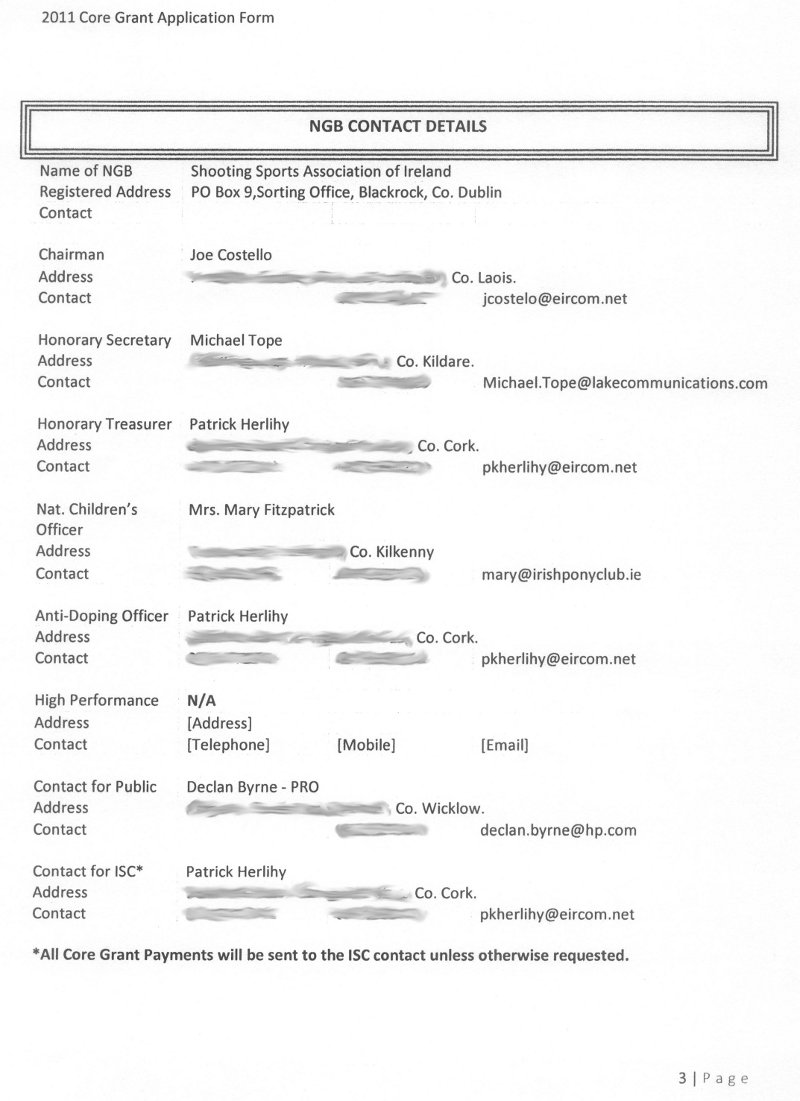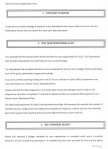Obviously, running a sporting body is an endeavor which has a financial cost. Facilities cost money to run, consumables cost money to keep in stock, and there are often administrative fees and such to be concerned about. However, the worth of sport to society as a whole is well established. Between improving the health of the nation (and thus reducing the expense of running its healthcare system) and improving the lives of those involved by giving them a sense of personal achievement and control over their destiny (at least within the limited venue of the playing field), it is obvious that sport is a positive thing within society and that as such, society should promote and encourage it.
As a result of this, whether the sporting body in question is a club or a body higher up the administration chain, there are often many grants available from both public and private sources. These grants not only support local and regional clubs in their chosen sports; they also support the National Governing Bodies of those sports as not all sports earn (or are able to earn) sufficient amounts to support their top level administration in the way that (for example) the GAA can. These top level administrative grants cover basic running costs, training, developmental work, specific sporting projects and so forth and are on the whole a good thing.
In Ireland at the moment, two shooting bodies are eligible for these grants, which are administered by the Irish Sports Council (ISC), and one more is applying for eligibility (this is not a secret). The two recognised bodies are the Irish Clay Pigeon Shooting Association (ICPSA), who administer clay pigeon shooting; and the Shooting Sports Association of Ireland (SSAI), who administer non-Olympic rifle and pistol target shooting; and the body applying for recognition is the National Target Shooting Association (NTSA), who administer Olympic rifle and pistol target shooting.
Obviously, these are public monies being distributed, and as such, levels of oversight are required and facilitated by an application process administered by the Irish Sports Council. Every year, they compile a list of eligible bodies and send those bodies an application form to complete listing off how much money they want, what they want it for, and how they spent the last grant they received (this is obviously a very short summary of the form; it is far more formal and expansive than this, but this does capture the gist of it). Delays in this process can and do arise owing to paperwork issues and so forth, and these are resolved through dialogue between the Irish Sports Council and the Body in question. Since dialogue is a necessary part of the process, each body must nominate a contact point. This is all standard for such matters.
Thus, which this background in place, let us consider a recent discrepancy in the application process.
As regular readers have already heard, there was recently a Questions and Answers session held in public by the SSAI Chairman, mainly (though not exclusively) for members of the National Association of Sporting Rifle and Pistol Clubs (NASRPC). Amongst the many complaints and criticisms worded in question form at that meeting in early October, there was a long discussion of the Irish Sports Council grant to the SSAI. It was explained, at some length but without naming names, that due to a failure of a previous committee to keep adequate records of how one aspect of the funding from the Irish Sports Council had been used, there was an indefinite delay on further funding for the Irish Sports Council until such time as the paperwork was in order once more.
This prompted much noise and heat (if very little light) from the members of the audience, whose National Governing Body, the NASRPC – as an affiliated member of the SSAI – derived much of its annual funding from the Irish Sports Council grant. The mechanism for this was simple in nature – each affiliated member of the SSAI prepared a grant application and forwarded this to the SSAI committee, who collated these applications into a single composite document and forwarded it to the Irish Sports Council for consideration. With the Irish Sports Council grant on hold therefore, the NASRPC could not obtain monies through this route. It was spelled out in no uncertain terms that while this was unfortunate and a resolution was being sought with vigour, the problem had been caused during the tenure of the previous SSAI committee, who were now the loudest complainants from the NASRPC and who indeed held committee posts within the NASRPC. The SSAI undertook to continue to work on the problem, and the matter appeared to rest at that point.
However, a recent Freedom of Information request made to the Irish Sports Council turned up a very unusual document, namely an application made to the Irish Sports Council by the SSAI in November 2010 – a month after the meeting where it was publicly stated that the SSAI would not be eligible for an Irish Sports Council grant for several more months. It was curious that they would have submitted an application so quickly given the scale of the problem being dealt with; and even more so that they would have had time to solicit and receive grant application submissions from each of its affiliated members; the time this task takes each year has traditionally been far longer than this.
Upon further careful reading of the application, some puzzling inconsistencies jump out. The application in full is attached at the bottom of this entry (after the link), but for our purposes we can examine just the two relevant pages in detail. Looking first at the contacts page, the inconsistency is immediately obvious:
 You will, I trust, forgive the redaction of personal addresses, but matters of personal security should be kept in mind here.
You will, I trust, forgive the redaction of personal addresses, but matters of personal security should be kept in mind here.
For those who have not spotted it yet, the inconsistency lies in the stated Contact for ISC person of Patrick Herlihy. Mr. Herlihy is not the designated contact point for the Irish Sports Council to the SSAI, that would be the Chairman of the SSAI, Joe Costello. This error seems most unusual – and indeed, the Irish Sports Council though so too and rejected the application for that reason (as well as some others), stating that if the contact point was to be changed to Mr.Herlihy, then some documentation approving that change would be required from Mr.Costello (for obvious reasons – otherwise any person could submit, for example, a claim for thousands of euro from the GAA grant and cite themselves as the contact point for verification of this claim; a situation with very obvious defects from the point of view of responsibly distributing public monies).
The inconsistency becomes more obvious on the signature page of the document:
The puzzling point here was the question of why, on a form of some importance and consequence, filed well ahead of schedule with the Irish Sports Council, were the signatories the Public Relations Officer and the Treasurer, instead of the Chairman and the Secretary or the Treasurer, as was normal in such cases?
Subsequent inquiries provided resolution to this puzzle – it transpired that the document had in fact been prepared, signed and sent to the Irish Sports Council without the prior authorisation of the SSAI. No SSAI board meeting had approved the document, nor had the Chairman been made aware of it prior to its dispatch despite being the designated SSAI contact point for the ISC.
An uncharitable mind might use ugly words to describe such an act.
Perhaps we could be charitable and recall the adage that one should never attribute to malice what is equally explainable by utter incompetence? Some, it seems likely, will not; yet perhaps they should offer at least the opportunity for those involved to point out their innocent error before making any legally actionable charges. There could be a completely innocent explanation for why, for example, it escaped Mr.Herlihy’s mind while preparing the document that he was not at the time in fact the Honorary Treasurer of the SSAI, and had not been for some time.
Either way, it seems obvious that such an action, at a bare minimum, cannot have greatly aided relations between the SSAI and the Irish Sports Council at a time when grants and funding were already at issue, no matter how heartening it is to see that the controls enacted by the Irish Sports Council were successful in preventing the inadvertently erroneous allocation and distribution of public monies.
The full application:












































You must be logged in to post a comment.